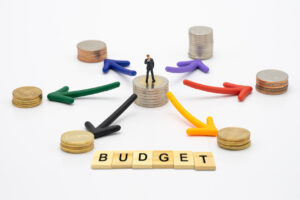Managing your money shouldn’t feel like solving a puzzle every month, yet many people struggle with budgeting because they’re making avoidable mistakes. These financial missteps can turn budgeting from a helpful tool into a source of frustration and stress. The good news is that most budgeting problems stem from a handful of common errors that can be corrected quickly once you know what to look for. Understanding these mistakes and learning how to fix them can transform your relationship with money and put you on the path to financial success.
Not Tracking Expenses
Most people have no idea where their money actually goes each month. They might remember the big purchases like rent or groceries, but the smaller expenses disappear into a financial black hole. Without tracking your spending, you’re essentially budgeting blind, making it impossible to create realistic spending plans or identify areas where you can cut back.
Start fixing this mistake by tracking every expense for at least one month. Use a smartphone app, spreadsheet, or simple notebook to record every purchase, no matter how small. Don’t try to change your spending habits during this tracking period—just observe and record. This baseline data will reveal your true spending patterns and provide the foundation for creating a realistic budget. Many people are shocked by what they discover during their first month of tracking, but this awareness is the first step toward better financial control.
Lack of a Budget
Flying by the seat of your pants financially might feel freeing, but it’s a recipe for money problems. Without a budget, you have no roadmap for your money, no spending limits, and no way to ensure you’re working toward your financial goals. People without budgets often find themselves wondering where their money went and why they never seem to have enough for the things that matter most.
The absence of a budget also makes it difficult to make informed financial decisions. When you don’t know how much you have available for different categories, every spending choice becomes a guess. This uncertainty can lead to overspending in some areas while neglecting others, creating an unbalanced financial life that doesn’t align with your priorities or values.
Unrealistic Budgeting
Optimistic budgeting is one of the fastest ways to set yourself up for failure. When you create a budget that assumes you’ll suddenly develop superhuman willpower and completely change your spending habits overnight, you’re setting unrealistic expectations that are impossible to maintain. This might mean allocating only $200 per month for groceries when you typically spend $400 or planning to eliminate all entertainment spending when you currently spend $300 monthly on activities you enjoy.
Unrealistic budgets often fail within the first few weeks, leading to frustration and the mistaken belief that budgeting doesn’t work. The reality is that sustainable budgeting requires gradual changes and realistic expectations about your spending patterns. Dramatic cuts might work for a few weeks, but they’re not sustainable long-term and often lead to budget abandonment.
Ignoring Irregular Expenses
Car repairs, medical bills, holiday gifts, and annual insurance premiums have one thing in common—they’re irregular expenses that can destroy your budget if you don’t plan for them. Many people budget for their monthly expenses but forget about these less frequent costs that can pop up at any time. When these expenses arise, they often lead to credit card debt or force you to raid other budget categories.
Irregular expenses are particularly problematic because they feel unexpected even when they’re predictable. You know your car will need maintenance, that holidays come every year, and that insurance premiums are due annually. The challenge is that these expenses don’t fit neatly into monthly budgeting, so they’re often overlooked until they become urgent.
Not Reviewing Your Budget Regularly
Creating a budget is just the beginning—maintaining and adjusting it is where the real work happens. Many people create a budget once and then never revisit it, assuming it will continue to work regardless of changing circumstances. Life changes constantly, and your budget needs to evolve with your income, expenses, and financial goals.
Without regular reviews, your budget becomes outdated and irrelevant. You might get a raise and continue living on your old budget, missing opportunities to increase savings or debt payments. Alternatively, you might face new expenses or changed circumstances that make your current budget impossible to follow, leading to frustration and budget abandonment.
Impulse Spending
Impulse purchases are budget killers that can quickly derail even the most carefully planned financial strategy. These unplanned expenses often seem small individually, but they add up quickly and can consume money allocated for other priorities. Impulse spending is particularly dangerous because it’s often emotional rather than rational, making it difficult to control through willpower alone.
The rise of online shopping and mobile payments has made impulse spending easier than ever. With one-click purchasing and saved payment information, you can make unplanned purchases without the natural pause that comes with handling cash or even pulling out a credit card. Social media advertising and targeted marketing also create more opportunities for impulse purchases by constantly presenting you with tempting offers.
Not Setting Financial Goals
Budgeting without clear financial goals is like driving without a destination—you might stay on the road, but you won’t get anywhere meaningful. Without specific goals, your budget becomes just an exercise in tracking rather than a tool for achieving financial success. Goals provide motivation and direction, helping you make trade-offs and prioritize your spending.
Vague goals like “save more money” or “pay off debt” aren’t specific enough to guide your budgeting decisions. Without clear targets and timelines, it’s impossible to know whether you’re progressing or how to adjust your strategy. This lack of clarity often leads to inconsistent efforts and disappointing results.
Set specific, measurable financial goals with clear deadlines. Instead of “save more money,” commit to “save $5,000 for an emergency fund within 12 months.” Instead of “pay off debt,” specify “pay off $10,000 in credit card debt within 18 months.” Once you have clear goals, work backward to determine how much you need to save or pay each month to achieve them. This approach transforms abstract financial concepts into concrete monthly budget items, making it easier to stay motivated and track progress.
Taking Control of Your Financial Future
The path to financial success isn’t about achieving perfection—it’s about recognizing and correcting common mistakes that derail your progress. Each of these budgeting mistakes is fixed with the right approach and commitment. Start by identifying which mistakes you’re currently making, then focus on correcting one or two at a time rather than trying to overhaul your entire financial system at once.
Remember that budgeting is a skill that improves with practice. Your first budget won’t be perfect, and that’s okay. The key is to start somewhere and continuously refine your approach based on what you learn about your spending patterns and financial priorities. Be patient with yourself as you develop new habits, and celebrate small victories along the way.
The envelope budgeting method can be particularly helpful for addressing several of these common mistakes simultaneously. By allocating cash to specific spending categories, you naturally limit impulse purchases, force yourself to track expenses, and create realistic spending limits. This visual approach makes budgeting more tangible and immediate, helping you develop better financial habits more quickly.




